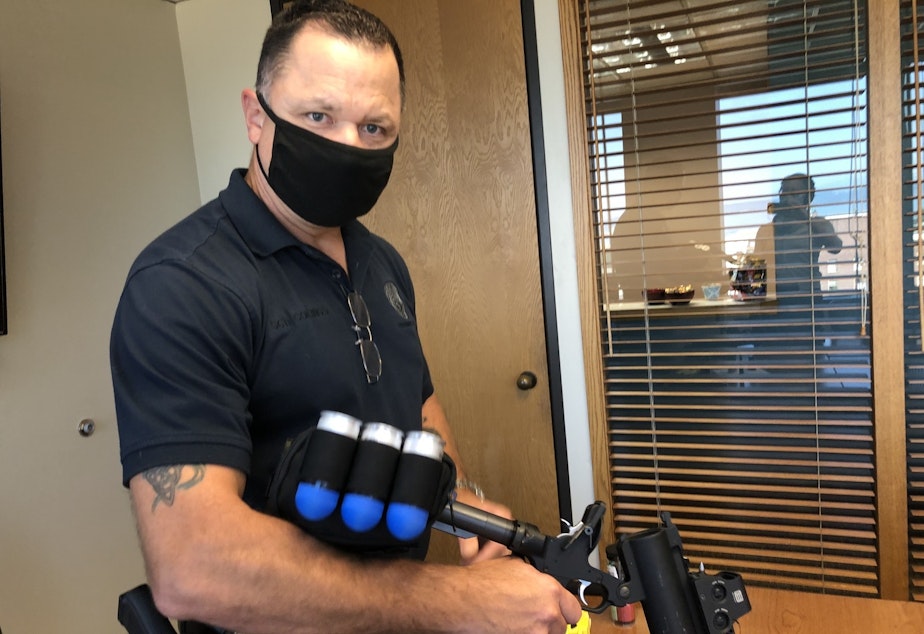WA lawmakers outline 2 quick fixes to new policing laws

Washington lawmakers appear anxious to fix new laws that many law enforcement agencies argue have hindered their ability to use less-lethal ammunition, and to take people into custody during a mental health crisis.
The House Public Safety Committee heard support from law enforcement and members of the public Tuesday for proposals to ensure police access to less-lethal ammunition, and to clarify the authority of police officers who assist with “community caretaking” functions.
House Public Safety Committee Chair Roger Goodman said he and Rep. Jesse Johnson, the vice chair, have traveled the state to understand the impacts of HB 1310 (use of force) and HB 1054 (tactics and equipment) since they took effect last July.
Less-than-lethal
HB 1719 would narrow the state’s new ban on police use of military equipment to exclude non-lethal projectiles and launchers. That’s after many police agencies put use of less-lethal munitions on hold, in response to the general ban on large-caliber ammunition.
Port Angeles Police Chief Brian Smith told legislators that he stopped using 40mm launchers on advice from city lawyers when HB 1054 took effect last July. These types of launchers fire large, less-than-lethal projectiles, like foam balls.
“We’re looking forward to putting our 40mm launchers back into our vehicles as soon as we can," Chief Smith said.
Hoquiam Police Chief Jeff Myers said his agency had the same concern with 12 gauge shotguns used for less-lethal beanbag rounds.
“We’ll be looking forward to getting this signed as quickly as possible by the governor so we can reinstall those into our vehicles,” Myers said.
He said his agency also bought a less-lethal device that uses compressed air, but many other agencies in Washington ordered it at the same time and it’s still on backorder.
Sponsored
James McMahan, policy director with the Washington Association of Sheriffs and Police Chiefs called the impact on less-lethal rounds an unintended consequence of the new law.
“We didn’t catch it,” he said.
House Public Safety Committee Chair Goodman said he hopes legislators will enact fixes as soon as possible.
Physical force
The committee also heard support Tuesday from law enforcement and community members for HB 1735, which clarifies that police officers have the authority to use physical force in non-criminal matters: protecting juveniles, serving court orders, and taking people into custody in cases involving involuntary treatment.
In the wake of HB 1310, which placed restrictions on the use of force by police, many law enforcement agencies said officers could no longer respond to crisis calls where no crime was being committed because they lacked authority to detain or transport people.
“We didn’t clarify that police can continue to do this great work they’ve been doing," Goodman said.
Diane Ostrander told the committee her son had a mental health crisis last October, and police refused to take him to the hospital against his will. She said they told her he would have to commit a crime to get medical treatment.
“Because of this, he was forced into 25 days of homelessness in severe weather," Ostrander said. "He was arrested once in Bellevue on December 3 and once in Des Moines on January 4. The second charge on January was for domestic violence in the fourth degree against me. His mother.”
Ostrander said her son was sent from jail to a medical facility, but she said “He still has those charges to face as well, when all he needed was medical help.”
The general consensus around the first two bills was in stark contrast to the response to HB 1726, which proposes to restore the ability of police officers to forcibly detain someone based on "reasonable suspicion" that they committed certain types of crimes: a violent offense, a sex offense, an assault, or domestic violence. The state’s new policing laws require the police now have “probable cause,” a higher standard of proof, before making that detention.
Police have said the higher bar is harming their abilities to pursue suspects and prevent crimes in progress. But rolling back that standard is opposed by civil rights and police accountability advocates, who want the recently enacted changes to stay on the books.
Sponsored
Rhonda Smith-Banchero told the committee about her son’s experience in a baseless police stop.
“Any change in use of lethal force or use of force on these stops really needs to be examined, as you are impacting brown children who have had no history with law enforcement," Smith-Banchero said.
Law enforcement groups also opposed Goodman’s proposal. WASPC’s James McMahan said allowing stops for just a select list of charges would be overly technical and unworkable for officers in the field.
“We’re relying on officers to know definitions of definitions of definitions here," McMahan said. "And they have to get it right, the consequence for using excessive force are dire.”
At the conclusion of the hearing Goodman said that legislation may not be passable.
“By introducing this bill I certainly did not seek to win a popularity contest, and we have certainly a lot of controversy here” he said.
Goodman said he’ll continue to work with stakeholders and the Attorney General’s Office to try to find the right balance for allowable police stops.




